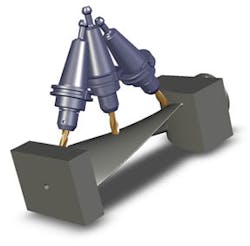CAM Increases Multiaxis Machining Speed and Finish
Noting that multiaxis machining can result in significant improvements in a shop’s competitiveness, CNC Software Inc. is introducing a unified interface and streamlined workflow for generating multiaxis toolpaths in the latest release for its Mastercam family of machining programs, Mastercam X5.
The Mastercam family of machining program offers a range of basic and advanced multiaxis machining strategies, giving programmers complete control over the three crucial elements of multiaxis machining – cut pattern, tool axis control, and collision control.
Cut patterns
Cut patterns guide the tool along specified paths, which may be simple 2D and 3D wireframe, solid primitives (for example, box, cylinder, or sphere), or complex multisurface grids. Mastercam’s Multiaxis machining has several toolpath types to govern the cut pattern including curve wireframe for trimming operations; swarf fanning and swarf machining over multisurface floors, plus rail swarf cutting for added control; and multisurface 5-axis roughing and finishing, including depth cuts, plunge roughing, and flow line machining and drilling. Also, the program handles stock recognition that trims toolpaths to eliminate air-cuts and reduce cycle times; and custom applications for machining cylinder heads and converting probe data to machinable geometry.
Mastercam X5 introduces eight new triangular mesh multiaxis toolpaths that support surface, solid, and STL inputs.
Tool axis control
Mastercam’s Tool Axis Control allows orientation of the tool’s center axis to be manipulated as it follows the cut pattern. The programmer has complete and dynamic control over the tool axis, lead/lag, entry/exit, and tilt, which simplifies difficult multiaxis jobs. Full entry and exit control lets the programmer determine exactly where and how the cutter enters and leaves the part. An automatic point generator adds greater precision, as well as advanced gouge checking and a 5-axis safe zone around the part.
Powerful axis limits control tool motion between defined angles, ensuring that the tool tilt does not violate part or machine tool limits. It’s simple for the programmer to refine control of the tool axis with a few simple pieces of CAD geometry. Shank containment simplifies cutting in confined areas.
Collision control
When programming 5-axis parts, it is often necessary to come very close to the part or fixture with the cutter, arbor, or the holder. Mastercam is able to present “near miss tolerance” fields so the programmer can specify how close to get with any part of the tool, and how to avoid those situations. Mastercam X5 introduces a unified interface and a streamlined workflow for multiaxis toolpaths. The selection screen tree structure will change based on the toolpath family and type selections. The tree is laid out in the logical order of setting your toolpath parameters. Simply advance along the tree structure, choosing your options and setting your parameters along the way, to create the desired multiaxis toolpath.
Maintenance update
Also recently, Mastercam released a maintenance update for Mastercam X5 that expands machining flexibility and increases emphasis on speed and automation.
Mastercam X5 MU1 has a number of functional highlights. For example, in the Mill function users will find enhanced gouge checking and containment options for 3D high-speed toolpaths, as well as improved Curve 5-axis Swarf 5-axis cutting, allowing overlap. The Router function now allows the ability to drag and drop parts from one sheet to another during geometry or toolpath nesting, and output block drilling parameters that simplify use on set-up sheets and with certain point-to-point routers.
Other significant Maintenance updates affect the Wire and CAD Tools functions. With the release of Mastercam X5 MU1, CNC Software also introduced Mastercam Port Expert, a purchasable add-on designed for head porting operations.
The Mastercam X5 MU1 update is available at no charge to current Mastercam Maintenance customers.
